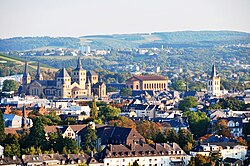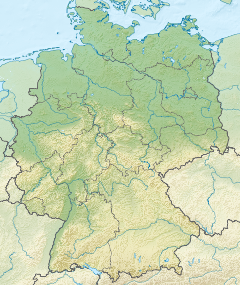Trier-Biewer
| Trier | ||
|---|---|---|

View over Trier
|
||
|
||
| Coordinates: 49°45′N 6°38′E / 49.750°N 6.633°ECoordinates: 49°45′N 6°38′E / 49.750°N 6.633°E | ||
| Country | Germany | |
| State | Rhineland-Palatinate | |
| District | Urban district | |
| Government | ||
| • Lord Mayor | Wolfram Leibe (SPD) | |
| Area | ||
| • Total | 117.13 km2 (45.22 sq mi) | |
| Elevation | 137 m (449 ft) | |
| Population (2015-12-31) | ||
| • Total | 114,914 | |
| • Density | 980/km2 (2,500/sq mi) | |
| Demonym(s) | Trevian | |
| Time zone | CET/CEST (UTC+1/+2) | |
| Postal codes | 54290–54296 (except 54291) | |
| Dialling codes | 0651 | |
| Vehicle registration | TR | |
| Website | www.trier.de | |
| Largest groups of foreign residents | |
| Country of birth | Population (2013) |
|---|---|
|
|
688 |
|
|
675 |
|
|
573 |
|
|
476 |
|
|
444 |
|
Roman bath ruins in Trier.
|
|
| UNESCO World Heritage Site | |
|---|---|
| Location |
Rhineland-Palatinate, Germany |
| Coordinates | 49°45′24″N 6°38′29″E / 49.7567°N 6.6414°E |
| Area | 117,140,000 m2 (1.2609×109 sq ft) |
| Criteria | i, iii, iv, vi |
| Reference | 367 |
| Inscription | 1986 (10th Session) |
| Website | www |
|
[]
|
|
Trier (German pronunciation: [tʁiːɐ̯]; Luxembourgish: Tréier [ˈtʀɜɪɐ]), formerly known in English as Treves (French: Trèves, IPA: [tʁɛv]) and Triers (see also names in other languages), is a city in Germany on the banks of the Moselle. Trier lies in a valley between low vine-covered hills of red sandstone in the west of the state of Rhineland-Palatinate, near the border with Luxembourg and within the important Moselle wine region.
Founded by the Celts in the late-4th century BC as Treuorum, it was later conquered by the Romans in the late-1st century BC and renamed Trevorum or Augusta Treverorum (Latin for "The City of Augustus among the Treveri"). Trier may be the oldest city in Germany. It is also the oldest seat of a bishop north of the Alps. In the Middle Ages, the Archbishop-Elector of Trier was an important prince of the church, as the archbishop-electorate controlled land from the French border to the Rhine. The Archbishop-Elector also had great significance as one of the seven electors of the Holy Roman Empire.
...
Wikipedia




